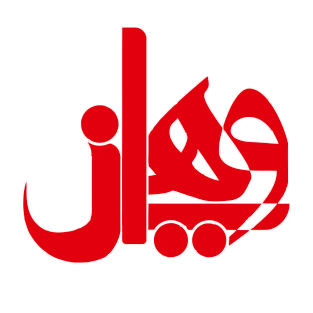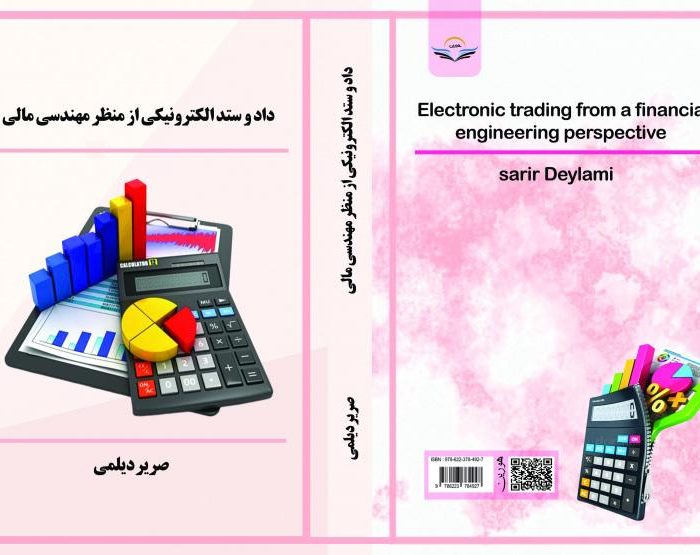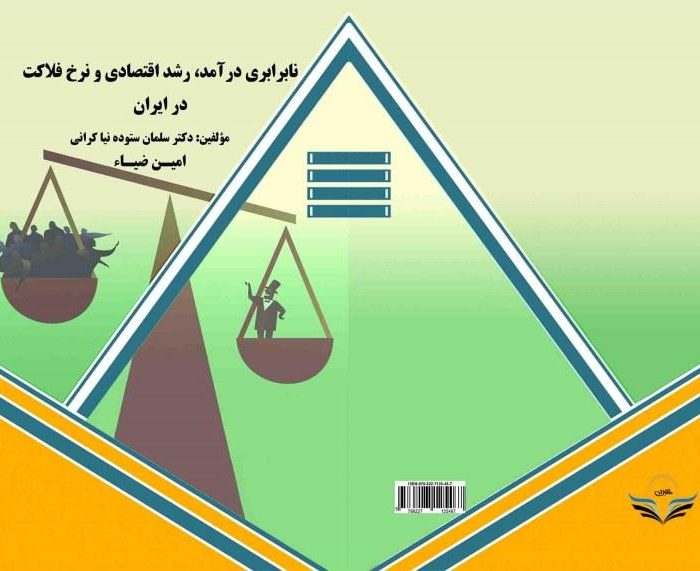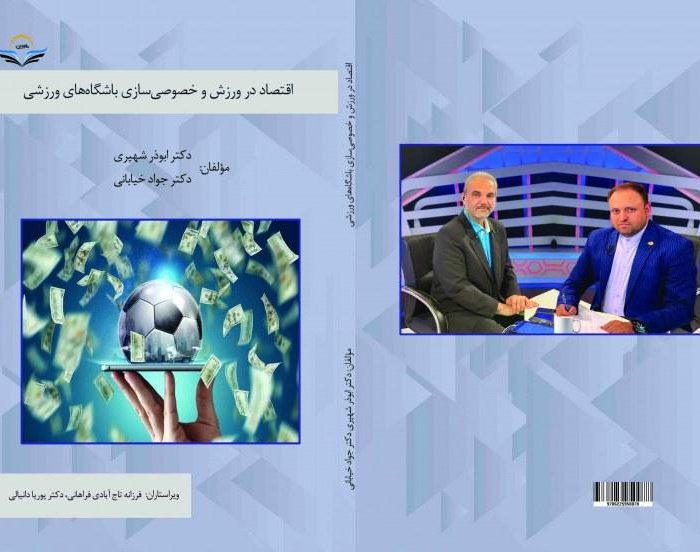کتاب The status and performance of special rapporteurs on human rights with a view to protecting economic, social and cultural rights
- صفحه نخست
- رشته ها
- علوم انسانی
- اقتصاد
- کتاب The status and performance of special rapporteurs on human rights with a view to protecting economic, social and cultural rights
کتاب The status and performance of special rapporteurs on human rights with a view to protecting economic, social and cultural rights
۴۷۸,۹۲۹ تومان قیمت اصلی: ۴۷۸,۹۲۹ تومان بود.۱۸۶,۷۸۲ تومانقیمت فعلی: ۱۸۶,۷۸۲ تومان.
| تعداد صفحات | 99 |
|---|---|
| شابک | 978-622-378-149-0 |
| انتشارات |

کتاب The Status and Performance of Special Rapporteurs on Human Rights with a View to Protecting Economic, Social and Cultural Rights
درباره کتاب
کتاب The Status and Performance of Special Rapporteurs on Human Rights with a View to Protecting Economic, Social and Cultural Rights یک اثر علمی است که به تحلیل وضعیت و عملکرد گزارشگران ویژه حقوق بشر در زمینه حقوق اقتصادی، اجتماعی و فرهنگی میپردازد. این کتاب بهویژه بر فرآیندهای مربوط به مسئولیتهای این گزارشگران در حفاظت و پیشبرد حقوق بشر، بهویژه حقوق اقتصادی، اجتماعی و فرهنگی، تمرکز دارد. همچنین تاریخچه، چالشها، و دستاوردهای آنها در سطوح بینالمللی و در تعامل با سایر نهادهای بینالمللی مورد بررسی قرار میگیرد.
موضوعات کلیدی کتاب
- تاریخچه و جایگاه گزارشگران ویژه حقوق بشر: در فصل اول کتاب، تاریخچه تأسیس گزارشگران ویژه سازمان ملل و بررسی مفهوم این نقش در سازمان ملل متحد، بهویژه در شورای حقوق بشر مورد بررسی قرار میگیرد.
- چالشهای پیشروی گزارشگران ویژه: این بخش به تحلیل چالشهایی میپردازد که گزارشگران ویژه در طول تاریخ با آنها روبهرو بودهاند و همچنین به نحوه حفظ و تقویت این نقشها در چارچوب شورای حقوق بشر پرداخته میشود.
- فرآیند انتخاب و وظایف گزارشگران ویژه حقوق بشر: در فصل دوم، فرآیند انتخاب گزارشگران ویژه حقوق بشر، معیارهای انتخاب، مدت زمان خدمت، مصونیت و سایر وظایف آنان در چارچوب شورای حقوق بشر توضیح داده شده است.
- ارتباط گزارشگران ویژه با دیگر نهادهای بینالمللی و سازمانهای غیردولتی: کتاب به نقش و عملکرد سازمانهای غیردولتی و سایر نهادهای بینالمللی در ارتباط با گزارشگران ویژه و تأثیر آنها در اقدامات حقوق بشری پرداخته است.
- حقوق اقتصادی، اجتماعی و فرهنگی: فصل سوم کتاب بهطور خاص به حقوق اقتصادی، اجتماعی و فرهنگی و نقش گزارشگران ویژه در نظارت و پیگیری اجرای این حقوق در سطح بینالمللی اختصاص دارد.
ویژگیهای کلیدی کتاب
- تحلیل جامع از عملکرد گزارشگران ویژه: این کتاب بهطور دقیق و جامع به تحلیل عملکرد گزارشگران ویژه در زمینه حقوق بشر با تمرکز بر حقوق اقتصادی، اجتماعی و فرهنگی میپردازد.
- مطالعهای دقیق در زمینه چالشها و دستاوردها: کتاب نهتنها چالشهای پیشروی گزارشگران ویژه را بررسی میکند، بلکه به دستاوردهای این نهادها در پیشبرد حقوق بشر و بهویژه حقوق اقتصادی و اجتماعی نیز میپردازد.
- نگاه انتقادی به تمایز بین انواع حقوق بشر: کتاب به بررسی انتقادی تمایز میان انواع مختلف حقوق بشر و اهمیت توجه ویژه به حقوق اقتصادی، اجتماعی و فرهنگی در راستای عدالت اجتماعی میپردازد.
چرا باید این کتاب را خواند؟
این کتاب بهویژه برای پژوهشگران، فعالان حقوق بشر، و افرادی که به دنبال درک عمیقتری از نقش گزارشگران ویژه حقوق بشر در حفاظت از حقوق اقتصادی، اجتماعی و فرهنگی هستند، مفید است. این اثر تحلیلی میتواند به درک بهتری از چالشها و راهحلهای موجود در این زمینه کمک کند و نقشی مؤثر در ارتقاء دانش و آگاهی در خصوص مسائل حقوق بشری در سطح بینالمللی ایفا کند.
مخاطبان هدف
- پژوهشگران حقوق بشر و حقوق بینالملل: کتاب برای پژوهشگران و محققان حوزه حقوق بشر و حقوق بینالملل منبعی ارزشمند است.
- فعالان حقوق بشر و سازمانهای غیردولتی: این کتاب برای کسانی که در زمینه حقوق بشر فعالیت میکنند و بهویژه به حقوق اقتصادی، اجتماعی و فرهنگی توجه دارند، بسیار مفید است.
- سیاستگذاران و مسئولان بینالمللی: کتاب به سیاستگذاران و مسئولان بینالمللی کمک میکند تا با نحوه عملکرد گزارشگران ویژه حقوق بشر و چالشهای موجود آشنا شوند و بهطور مؤثر در جهت حمایت از حقوق بشر گام بردارند.
سفارش کتاب
برای خرید نسخه چاپی یا دیجیتال کتاب The Status and Performance of Special Rapporteurs on Human Rights with a View to Protecting Economic, Social and Cultural Rights میتوانید به سایتهای معتبر فروش کتاب و مراکز علمی مراجعه کرده و نسخه مورد نظر خود را تهیه نمایید.
پرسش و پاسخ درباره کتاب “The Status and Performance of Special Rapporteurs on Human Rights with a View to Protecting Economic, Social and Cultural Rights” 📚🌍
1. این کتاب درباره چه موضوعی است؟ 🤔
📌 پاسخ: این کتاب به بررسی وضعیت و عملکرد گزارشگران ویژه حقوق بشر سازمان ملل میپردازد، بهویژه در حوزه حقوق اقتصادی، اجتماعی و فرهنگی. نویسنده به نقش، وظایف، چالشها و تأثیر این گزارشگران بر بهبود وضعیت حقوق بشر در سراسر جهان اشاره میکند.
2. گزارشگران ویژه حقوق بشر چه نقشی دارند؟ 🌎
📌 پاسخ: گزارشگران ویژه، کارشناسهای مستقلی هستند که از سوی سازمان ملل مأموریت دارند نقض حقوق بشر را بررسی کنند، گزارشهای بینالمللی ارائه دهند و پیشنهادهایی برای بهبود وضعیت حقوق بشر ارائه نمایند.
3. فصل اول کتاب چه موضوعاتی را پوشش میدهد؟ 📖
📌 پاسخ: فصل اول به تاریخچه تأسیس گزارشگران ویژه میپردازد، از جمله:
- نحوه شکلگیری این منصب در شورای اقتصادی و اجتماعی سازمان ملل
- چالشهای اولیه این گزارشگران در کمیسیون حقوق بشر
- مسیرهای تقویت و حفظ نقش گزارشگران ویژه در شورای حقوق بشر
4. نحوه انتخاب گزارشگران ویژه حقوق بشر چگونه است؟ 🏛️
📌 پاسخ: در فصل دوم کتاب توضیح داده شده که انتخاب گزارشگران ویژه طی یک فرآیند رسمی انجام میشود که شامل معیارهای صلاحیت، مدت زمان خدمت و مصونیت دیپلماتیک آنها است. این گزارشگران باید بیطرف و مستقل باشند.
5. گزارشگران ویژه چگونه با کشورها ارتباط برقرار میکنند؟ ✉️
📌 پاسخ: گزارشگران ویژه میتوانند از طریق ارسال نامههای رسمی، درخواست بازدید از کشورها، و استفاده از سیستم شکایات فردی با کشورها ارتباط داشته باشند. این روشها به آنها اجازه میدهد نقض حقوق بشر را مستند کرده و پیشنهادهایی برای اصلاح ارائه دهند.
6. گزارشگران ویژه چه مشکلاتی هنگام سفر به کشورهای مختلف دارند؟ 🚧
📌 پاسخ: برخی کشورها از ورود گزارشگران ویژه جلوگیری میکنند یا همکاری لازم را انجام نمیدهند. علاوه بر این، محدودیتهای قانونی، فشارهای سیاسی و تهدیدات امنیتی از دیگر مشکلات پیش روی آنهاست.
7. چرا حقوق اقتصادی، اجتماعی و فرهنگی اهمیت دارند؟ ⚖️
📌 پاسخ: این حقوق شامل حق آموزش، بهداشت، مسکن، تغذیه و شرایط کاری مناسب است. بدون رعایت این حقوق، عدالت اجتماعی برقرار نمیشود و جوامع به توسعه پایدار دست نخواهند یافت.
8. گزارشگران ویژه چگونه عملکرد دولتها را نظارت میکنند؟ 🔍
📌 پاسخ: آنها از طریق گزارشهای رسمی، بررسی قوانین داخلی کشورها، دریافت شکایات، انجام تحقیقات مستقل و ارائه توصیهها به سازمان ملل و دولتها، عملکرد دولتها را رصد میکنند.
9. فصل سوم کتاب چه مباحثی را پوشش میدهد؟ 📊
📌 پاسخ: در فصل سوم، عملکرد گزارشگران ویژه در زمینه حقوق اقتصادی، اجتماعی و فرهنگی بررسی شده است. همچنین، مکانیسمهای نظارتی سازمان ملل و روشهای اجرای این حقوق در سطح بینالمللی تحلیل شدهاند.
10. این کتاب چه منابعی را معرفی میکند؟ 📚
📌 پاسخ: در بخش پایانی کتاب، منابع معتبر فارسی و انگلیسی معرفی شدهاند که شامل مقالات علمی، گزارشهای سازمان ملل و کتب مرجع در زمینه حقوق بشر هستند. این منابع برای پژوهشگران و علاقهمندان به این حوزه بسیار مفید خواهند بود.
| تعداد صفحات | 99 |
|---|---|
| شابک | 978-622-378-149-0 |
| انتشارات |
.فقط مشتریانی که این محصول را خریداری کرده اند و وارد سیستم شده اند میتوانند برای این محصول دیدگاه ارسال کنند.
محصولات مشابه
-
کتاب دادو ستد الکترونیکی از منظر مهندسی مالی
۴۵۰,۰۰۰ تومانقیمت اصلی: ۴۵۰,۰۰۰ تومان بود.۱۷۸,۵۰۰ تومانقیمت فعلی: ۱۷۸,۵۰۰ تومان. -
کتاب نابرابری درآمد، رشد اقتصادی و نرخ فلاکت در ایران
۴۷۸,۹۲۹ تومانقیمت اصلی: ۴۷۸,۹۲۹ تومان بود.۱۸۳,۵۸۹ تومانقیمت فعلی: ۱۸۳,۵۸۹ تومان. -
کتاب اقتصاد در ورزش و خصوصیسازی باشگاههای ورزشی
۶۳۴,۵۰۰ تومانقیمت اصلی: ۶۳۴,۵۰۰ تومان بود.۲۱۱,۵۰۰ تومانقیمت فعلی: ۲۱۱,۵۰۰ تومان. -
کتاب برآورد مدل های اقتصاد سنجی با نرم افزار STATA
۴۳۱,۳۵۷ تومانقیمت اصلی: ۴۳۱,۳۵۷ تومان بود.۱۷۱,۱۰۵ تومانقیمت فعلی: ۱۷۱,۱۰۵ تومان.













دیدگاهها
هیچ دیدگاهی برای این محصول نوشته نشده است.